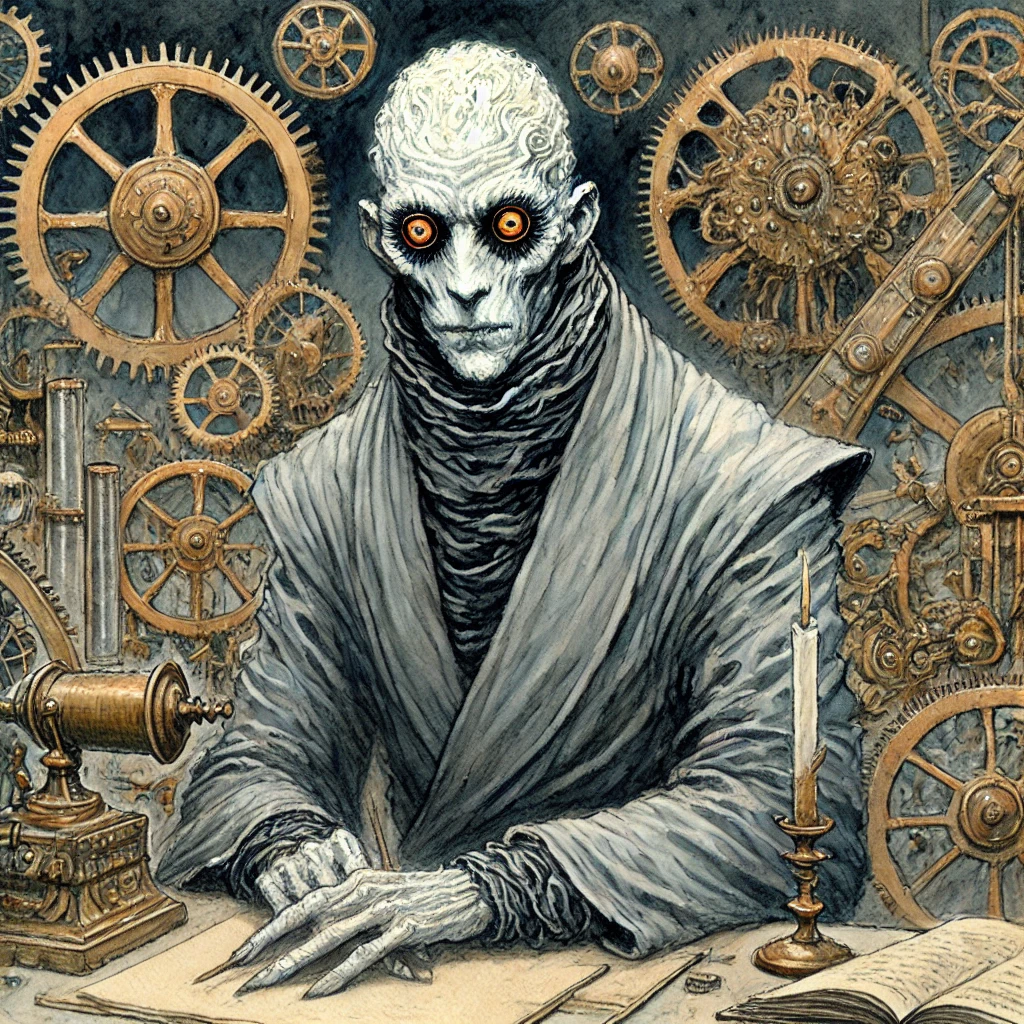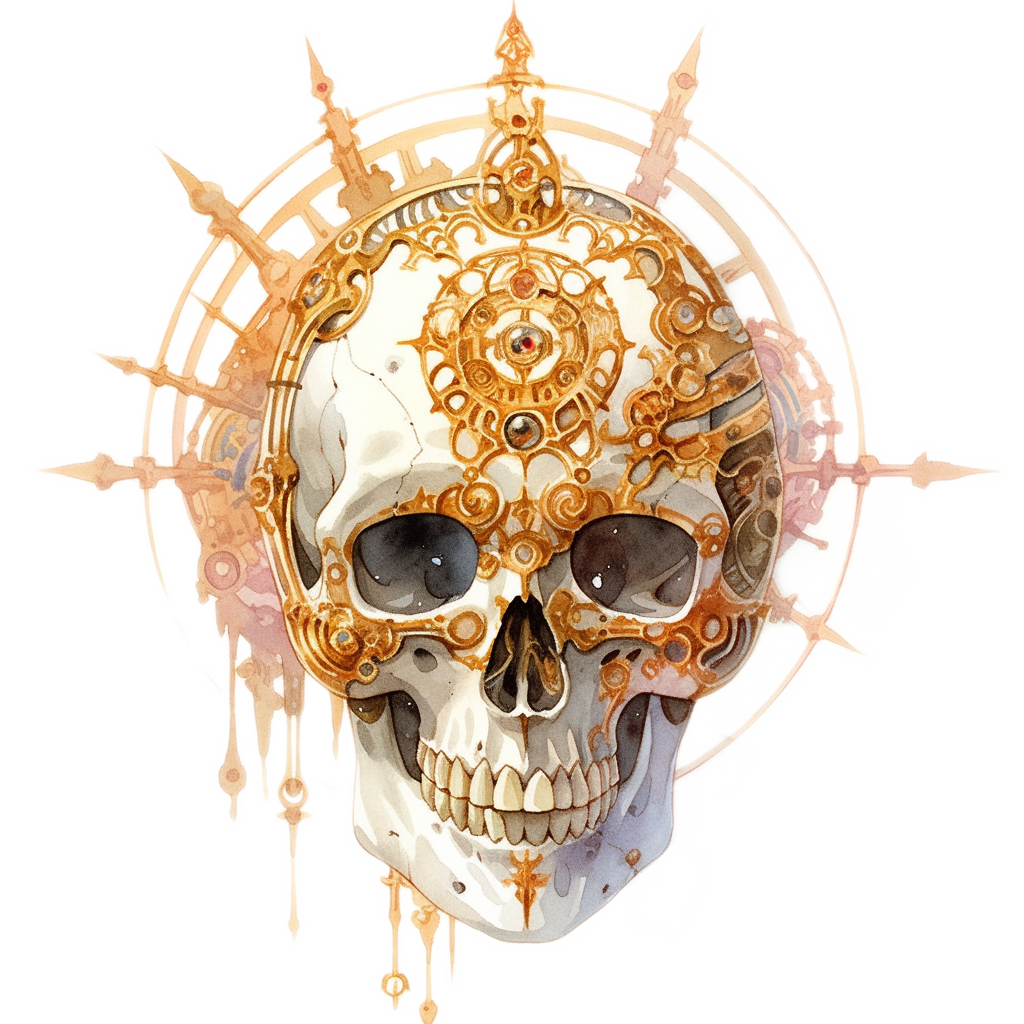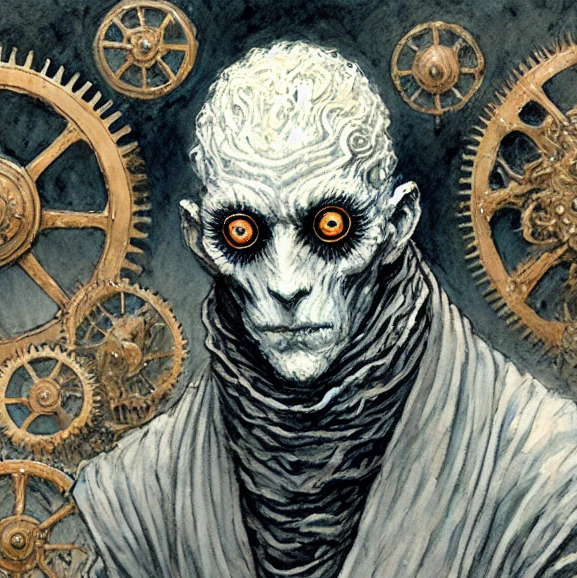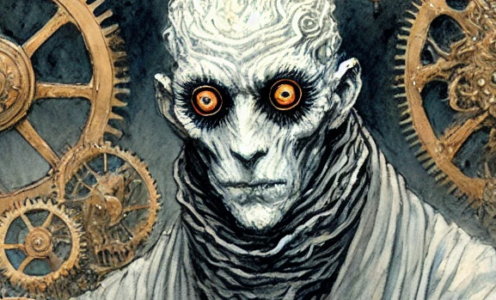Director Imryll Quast, The Unblinking Watcher

Location: Mechanus / The Premonitions Bureau
Perched at the very top of the hierarchy of the Premonitions Bureau—sits Director Imryll Quast (planar aphorite chronomancer [he/him] / Fraternity of Order / LN), a man whose name is spoken in the hushed tones of admiration and unease. Some call him The Unblinking Watcher, others The Man in the Endless Now. It seems like he doesn’t mind either name, so long as it’s said with the proper reverence.
Quast is a gaunt, porcelain-pale figure with eyes like tarnished brass clock faces. His pupils tick. No, really—they move like the hands of a clock, not in smooth arcs, but in sudden, precise jolts. No one knows if they’ve always been like that or if it’s a side effect of overexposure to the Integrators. His black robes shimmer with threads of quicksilver, and if you watch too long, you’ll swear they’re rippling, like shadows cast by something just outside your vision.
He has the stillness of a spider watching its web—a terrifying patience. He rarely speaks unless he must, and when he does, his words are slow, deliberate, and often sound like he is reading the verdict in a criminal trial. Cutters say the pauses between his sentences are so long that you can hear the ticking of Mechanus while you wait for the next word.
Quast’s Possible History
Imryll Quast’s past is a matter of speculation, rumour, and contradictions—as though his life has been edited. There are records of an Imryll Quast as a junior clerk for the Fraternity of Order in Sigil’s City Courts. A mortal, human, competent but unremarkable. But that Imryll vanished for twenty three years, and when he returned, he was different. His eyes ticked. His appearance was different, more mechanical, aphorite even. He spoke of “the gaps between moments” and “the threads behind the fabric.”
No one knows where he went. Some say he got Mazed and came back with his mind spliced. Others chant goes he was re-processed by Mechanus itself—pulled into its gears and spat back out as something no longer fully human. A few whisper that he somehow read the Prologue or Epilogue of reality itself, and it rewrote him.
What is known is this: after his return, Quast submitted the blueprints for the Premonitions Bureau, calling it “a necessary instrument of inevitability.” The Guvners approved its construction, though not without reservations. The Bureau’s grand purpose—predicting Future History—was audacious even by Fraternity standards, but Quast argued with unshakable logic that it was simply the next step in the Grand Mechanism. When you frame fate as a problem of information asymmetry, Guvners get all glassy-eyed with excitement.
Once it was built, Quast took his place as Director and never left. It’s been over a century, and though a human should have long since withered, he hasn’t aged a day.
Personality and Methods
Quast’s mind operates like a dispassionate clock—his every decision is weighed, balanced, and ticked into place. It’s not that he lacks emotion, but rather that he’s too aware of time. He sees moments as beads on a string, each one leading inevitably to the next. His patience is infinite because, as he preaches, all outcomes have already been decided. Chant goes you can’t surprise Quast—at least, no one has managed to do so in living memory.
Another unsettling part is that he never flinches, and barely reacts. A Seer could scream about “The Burning of the Nine Towers” with 97% certainty, and Quast will sip his tea (always mint) and simply nod. He’s not cold. He’s prepared. Every event is just another cog clicking into place.
But his most disquieting trait is his habit of knowing things he shouldn’t know yet. He’ll casually reference something you haven’t told him, or answer a question you didn’t ask aloud. Not prophecy, no. “Premonition through observation,” he calls it. “When you know the vectors of every moment, the future is as clear as the past.”
Goals and Vision
Quast’s official goal, in Fraternity terms, is to achieve Total Historical Foresight. The Integrators call it Closing the Loops. The rest of us would call it something much simpler: He wants to know everything before it happens.
But there’s more to it than just knowledge. If you listen closely to his lectures on inevitability and the symmetry of all events, you start to realise: Quast isn’t just predicting the future—he’s trying to fix it. He believes in a perfect timeline, one where every future action and reaction align with absolute elegance. No unexpected riots, no wild-card Xaositects setting fire to the Clerk’s Ward, no rogue modrons . No friction in the gears.
This is where the darkness seeps in. Control through knowledge. Quast doesn’t just want to observe the future — he wants to edit it. Quietly. Subtly. If a Seer predicts a murder, and that prediction becomes inevitable at 99.9%, Quast might just let it happen. “It serves the design,” he says. If a Xaositect is fated to disrupt a trial with a sudden act of violence, Quast ensures the guards are two steps too slow. To him, these moments are as essential as the steady ticking of a clock. The dark is that Quast has begun testing narrative correction—changing small details of future events to ensure consistency with Future History.
Obsession with the Future
Why is Quast so obsessed with the future? To understand that, you have to think like the cutter. To him, the future isn’t a mystery—it’s an unfinished machine. The present is just a flawed prototype, full of loose parts and unfiled edges. But the future? The future is perfect. It’s whole. It’s complete. Quast doesn’t want to live in the present because it’s broken. He wants to stand at the end of time and see every cog and gear turn in perfect synchrony. So why does the cutter look so haunted? Some whisper that he’s seen something terrible in the Last Moment. The Integrators occasionally reference it in their analysis: “Premonition of Terminal Event: Certainty 87%.” What is the Terminal Event? No one knows. But those who ask about it are reassigned. Quietly.
Quast preaches the inevitability of fate like a zealot, though he claims it’s not faith, but fact. His personal mantra is inscribed on the entrance archway in the Bureau: “Time is the only witness that never lies.” He claims future history is like a machine that builds itself from the scraps of its own past. He believes people are just walking patterns, their choices predictable if only you gather enough data. If you map it all—the actions, the thoughts, the mistakes—you can predict how the cogs will turn long before they click into place. This is why Quast collects the Unsolicited Omens from his Correspondents. He calls them ambient murmurs of inevitability. Every scrap of dream, omen, or wild prediction is another tooth in the great cog of fate.
The Whisper in the Gears
There is however, a final, more hidden fear among the Bureau’s senior staff. Late at night, after the Oracle chambers have gone silent and the tick-tock of the Integrators becomes the loudest sound you can hear, some claim they hear something else. A voice in the rhythm. It’s faint, like a breath behind your ear, just barely louder than the ticking. They call it The Whisper in the Gears.
One cutter swears they heard it say: “You watch too closely, little clockmaker. Watch long enough, and the clock will watch you back.” When this was reported to Quast, he only smiled—a rare, thin, dreadful smile. “The whisper is not a flaw,” he said. “It is the signal of understanding.” After that, the Integrators adjusted the Certainty Index for The Whisper Event to 72%.
Some of us think Quast isn’t trying to predict the future anymore. We think he’s trying to speak to it. And some of us think it’s already speaking back.
See Also: The Premonitions Bureau
Source: Jon Winter-Holt



